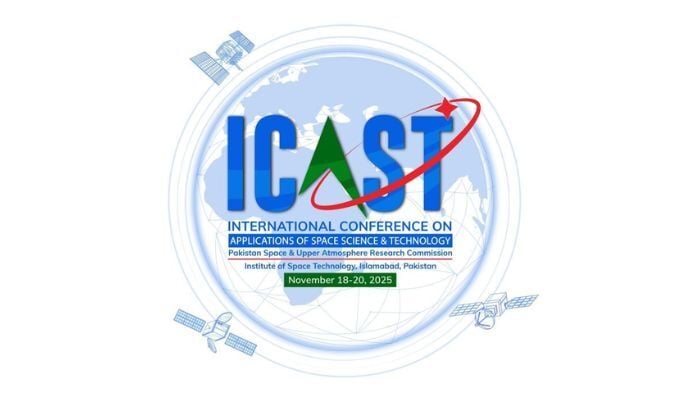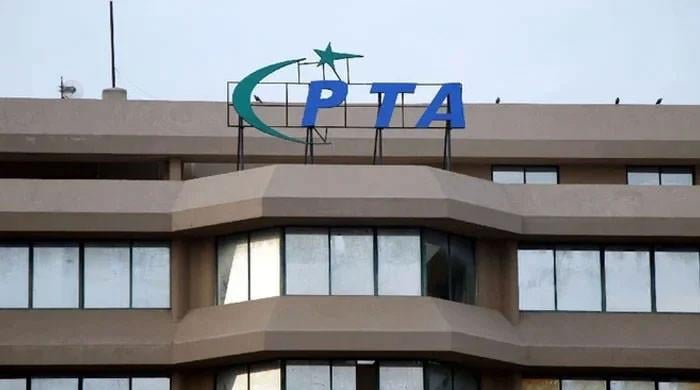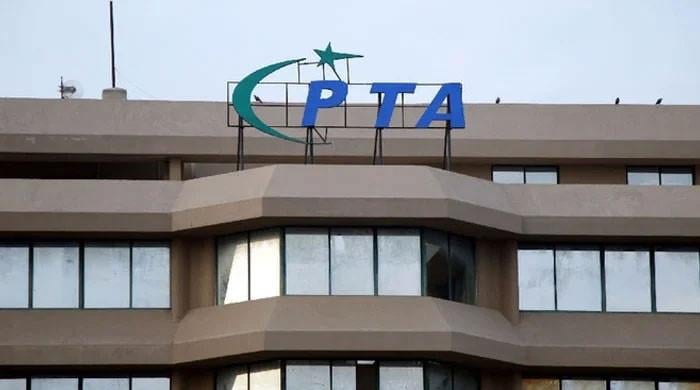ICAST-2025: Pakistan launches region's largest space science conference
Suparco and IST hosting astronauts, scientists and policymakers from over 25 countries in Islamabad
November 18, 2025

ISLAMABAD: Pakistan marked a significant milestone on Tuesday in its space journey with the inauguration of the International Conference on Applications of Space Science and Technology (ICAST-2025), the region’s largest space science and technology conference.
The event opened at the Institute of Space Technology (IST), jointly organised by the Pakistan Space and Upper Atmosphere Research Commission (Suparco) and IST.
The conference is being held with the collaboration of the Inter-Islamic Network on Space Sciences and Technology (ISNET), the Asia-Pacific Space Cooperation Organisation (APSCO), the Islamic World Educational, Scientific and Cultural Organisation (ICESCO), the Institute of Electrical and Electronics Engineers (IEEE), and the National Centre of GIS and Space Applications (NCGSA).
The conference brings together astronauts, scientists, policymakers, academic leaders, industry experts, and representatives of major international organisations, highlighting Pakistan’s growing leadership in the promotion of space science, technology, and innovation at both regional and global levels.
Suparco Chairman Muhammad Yousaf Khan formally inaugurated the conference.
Expressing pride in hosting the region’s flagship space event, he highlighted Suparco’s efforts to strengthen international cooperation and to advance space technologies for sustainable development.
IST Vice Chancellor Dr Syed Najib Ahmad reaffirmed Pakistan’s commitment to promoting space education, research, and capacity building, describing ICAST-2025 as an important link between global expertise and scientific advancement.
The Acting Chairperson of the Higher Education Commission (HEC), the Secretary General of APSCO, and the Director of the United Nations Office for Outer Space Affairs (UNOOSA) also addressed the gathering.
They praised Pakistan’s contributions to promoting equitable access to space science and supporting emerging space nations.
The chief guest, Mongolian astronaut Gurragchaa Jugder Demid, formally opened the conference with a compelling keynote address.
Recalling the experience of viewing Earth from space, he stated that science transcends borders and international collaboration is essential for human progress.
He emphasised the pivotal role of space technologies in sustainable development, climate monitoring, disaster preparedness, agriculture, resource management, and communications.
He said that platforms such as ICAST-2025 ensure that the benefits of space development reach all nations equitably. Appreciating Pakistan’s vision, he commended the efforts of Suparco and IST and expressed confidence that the dialogue at ICAST-2025 would lead to new partnerships and innovative solutions.
The first day began with the ISNET Strategic Leadership Summit (SLS), aligned with the United Nations Office for Outer Space Affairs’ Access to Space for All initiative. Leaders from OIC-COMSTECH, APSCO, ICESCO, and the Turkish Space Agency delivered keynote speeches, followed by a high-level dialogue featuring representatives from China, Tunisia, Iran, Bangladesh, and Senegal.
The summit concluded with the adoption of a Joint Communiqué, reiterating commitments to equitable access to space, open data sharing, capacity building, and enhanced cooperation among emerging space nations.
The technical program of the conference opened with several seminars, master classes, panel discussions, and workshops.
It began with a seminar on Space Technologies for National Security and Strategic Applications, followed by technical sessions on Astronomy and Astrophysics, Positioning, Navigation and Timing, Remote Sensing and Geographic Information Science, and Information and Communication Technologies.
These sessions included discussions on advancements in satellite systems, geospatial analytics, artificial intelligence (AI), and next-generation communication technologies.
The technical program also featured a panel discussion on “Precision, Positioning, and Beyond: Emerging Trends in GNSS Technology,” a technology exhibition forum, and special master classes on Physiology in Orbit, Space Law in Action, and Designing Complex Space Missions.
Additional sessions on aeronautics, satellite technology, and environmental science expanded the scope of the technical dialogue.
With participation from more than 25 countries and over 70 international delegates, ICAST-2025 is hosting a major global assembly of expertise across eight distinct tracks, including plenary sessions, master classes, special seminars, technical presentations, poster exhibitions, and technology shows.
The conference reflects Pakistan’s resolve to utilise space technologies for social development, economic stability, climate resilience, disaster preparedness, scientific progress, and international cooperation.
The conference will continue over the next two days, aiming to foster stronger partnerships, broaden global dialogue, and advance the peaceful use of outer space for the benefit of humanity.











